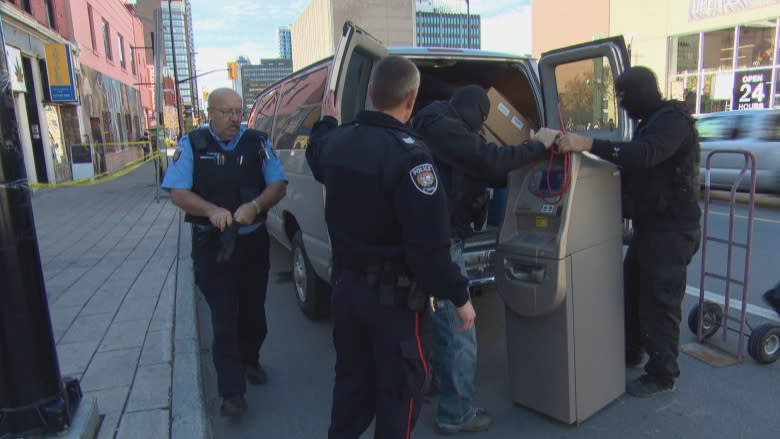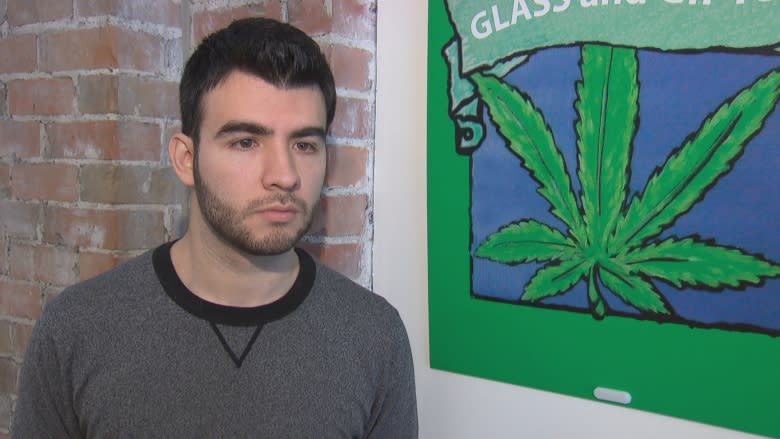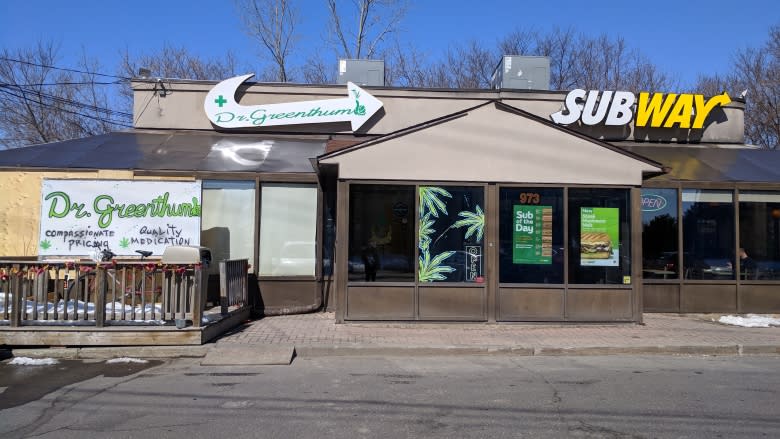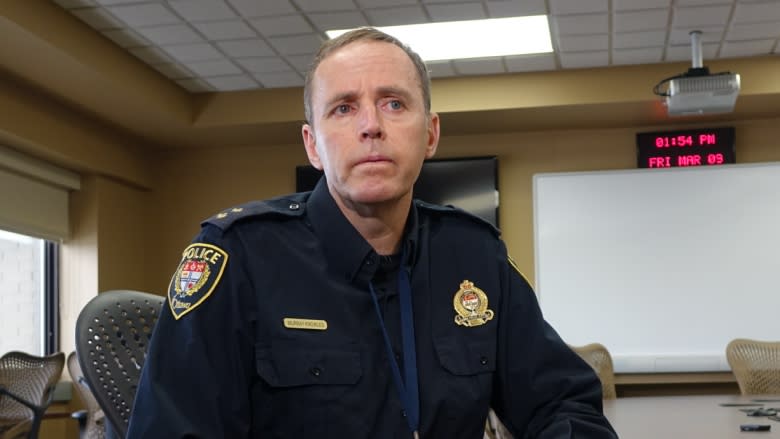Police walk thin green line as illegal pot shops flourish
Just before the lunch hour Monday, Weeds Glass and Gifts in Centretown was buzzing with customers young and old, lining up at the checkout as the smell of dried cannabis filled the air.
Just over a year ago a very different scene unfolded here, when armed police officers raided the illegal pot shop at 224 Bank St. as part of a wider crackdown on the budding cannabis black market. Police confiscated drugs and money, and arrested two workers.
The Jan. 31, 2017, raid had no lasting effect on the business. In fact, Weeds has since opened a second location on Montreal Road.
David Galindo, the 27-year-old manager of the shop, knows he's taking a risk just by coming to work every day. The thought of getting arrested is always in the back of his mind, but he's willing to take a chance.
"We're also here to stand up for what we believe, stand up for people who just want to be able to buy their cannabis and just be on their way," Galindo told CBC News.
Costly police raids
The shop was caught in one of 23 Ottawa police raids since September, 2016. Forty-three employees were arrested and charged with serious drug offences.
There were eight raids in 2016 and another 15 last year, according to police. Several of the dispensaries re-opened, sometimes just days later. One senior police officer compared the routine to "a game of whack-a-mole."
Source: Ottawa Police Service
Hundreds of charges dropped
At the same time, judges in Canada have been handing down increasingly lenient sentences, and Crown prosecutors have withdrawn hundreds of charges laid against the so-called "budtenders" who staff these shops.
Earlier this year, an Ottawa judge handed down an absolute discharge to an employee who had pleaded guilty to possession for the purpose of trafficking. A absolute discharge means the offender has no criminal record after one year.
That increasing tendency toward clemency raises the question of whether it's worth the time — and money — police are spending trying to shut the shops down.
Ottawa police could not provide CBC with an estimate of how much it has cost to investigate and raid the shops.
But an estimate from the Vancouver Police Department helps put the cost into perspective. In a 2015 report to the police board, Deputy Chief Const. Doug LePard said it cost $34,000 of taxpayers' money and 560 hours of police time to investigate and raid just one marijuana dispensary.
It took four detectives to conduct the investigation, 11 detectives to carry out the raid, two exhibit officers to go over the evidence and one civilian member to prepare documents for the Crown, according to the report.
"Deploying police resources to criminal enforcement against [marijuana] dispensaries where there is no overt public safety issue … is generally not an effective, efficient or proportional use of police resources," the report concluded.
If Ottawa police deployed the same resources for each raid as Vancouver police deployed in the above example, they would have spent $782,000 and more than 12,000 hours of police time to carry out the 23 raids.
Rethinking enforcement strategy
University of Ottawa criminology professor Eugene Oscapella said police should consider rethinking their marijuana enforcement strategy.
"If something is non-violent, if it's not causing problems in the community, little evidence of other drugs being sold, if there's some community tolerance for it, well, the police might better direct their resources elsewhere," Oscapella said.
Oscapella teaches drug policy and has appeared before parliamentary committees to advise the government on drug policy issues. He said police are in a difficult position because their job is to uphold the law, and they often face criticism when they fall short.
At the same time, police resources are finite and there's no clear sign the illegal shops will disappear even after Canada legalizes marijuana later this year.
"Maybe it would better serve the public interest if the police focused on other areas, such as gang-related violence, gun violence, things of that nature. It's a fair argument to be made," Oscapella said.
Ottawa defence lawyer Michael Spratt, who has represented a budtender caught up in police raids, noted it takes "considerable" police resources to investigate dispensaries — work that doesn't end when charges are laid.
"In a time of scarce resources and budget constraints I really think the police should be looking at devoting those resources to offences that may affect the community in a more dramatic way. For example, violent offences or gun offences," Spratt said.
Misplaced priorities
Not surprisingly, perhaps, Galindo agreed the raids are a waste of police resources.
"There's the fentanyl crisis, gang activity has gone up," he said. "There are all these things that seem to be more pressing, and the police could be focusing more on those things if they don't waste time and resources."
During the same two-year period that Ottawa investigated illegal pot shops, the city was also setting records for violent crime.
Police recorded 24 homicides in 2016, the highest body count since 1995. Last year the city set another new record with 73 shootings.
This year has also gotten off to a violent start with nine homicides and at least 20 shootings as of last week.
On the public health front, more people are dying from the opioid crisis. Public Health Ontario reported there were 53 opioid-related deaths in Ottawa from January to October of last year — a 76 per cent increase over the same 10-month period in 2016.
A 'constant balancing act'
Ottawa police Insp. Murray Knowles said it's a "constant balancing act" to manage their priorities, but the top one is always public safety.
While he conceded "numerous hours" are spent preparing a dispensary investigation, he denied that's getting in the way of the force's wider mandate.
"I don't think we have our priorities wrong. I think we're placing our priorities correctly, and we're trying to balance the demands on our … job to investigate crime," Knowles said.
As a result, Ottawa police have gradually placed less emphasis on shutting down dispensaries.
"We've had some gun violence issues of late, and we've also had the genesis of the opioid crisis and how serious that is. We've placed a lot of resources in regards to that. So it's certainly dropped the priority that we've placed on eliminating illicit drug dealing in those [marijuana dispensaries]," Knowles said.
Community frustration
The resilience of the illegal dispensaries poses a dilemma for elected officials, too.
The majority of the pot shops raided by Ottawa police are scattered along Montreal Road and Rideau Street, the main streets of Rideau-Vanier.
The councillor for the area, Mathieu Fleury, said residents have told him they want the illegal dispensaries shut down for good.
"We hear from community associations who ... ask us and ask the Ottawa police fundamental questions: if those operations are illegal, why are they continuing to operate?" Fleury said.
"And that's the big community frustration in all of this."
Ontario Attorney General Yasir Naqvi has warned the province will no longer tolerate the illegal dispensaries when government-run pot shops open their doors later this summer.
"If you operate one of these facilities, consider yourself on notice," Naqvi threatened during a news conference last September.
Making good on that threat will, of course, require the help of local police forces.
There have been no raids so far on dispensaries in Ottawa in 2018, but police promise the force's drug unit continues to monitor the shops.
Correction : An earlier version of this story stated that an Ottawa judge handed down a conditional discharge to an employee who had pleaded guilty to possession for the purpose of trafficking. In fact, the judge handed down an absolute discharge, which means the offender has no criminal record after one year.(Mar 22, 2018 9:50 AM)





